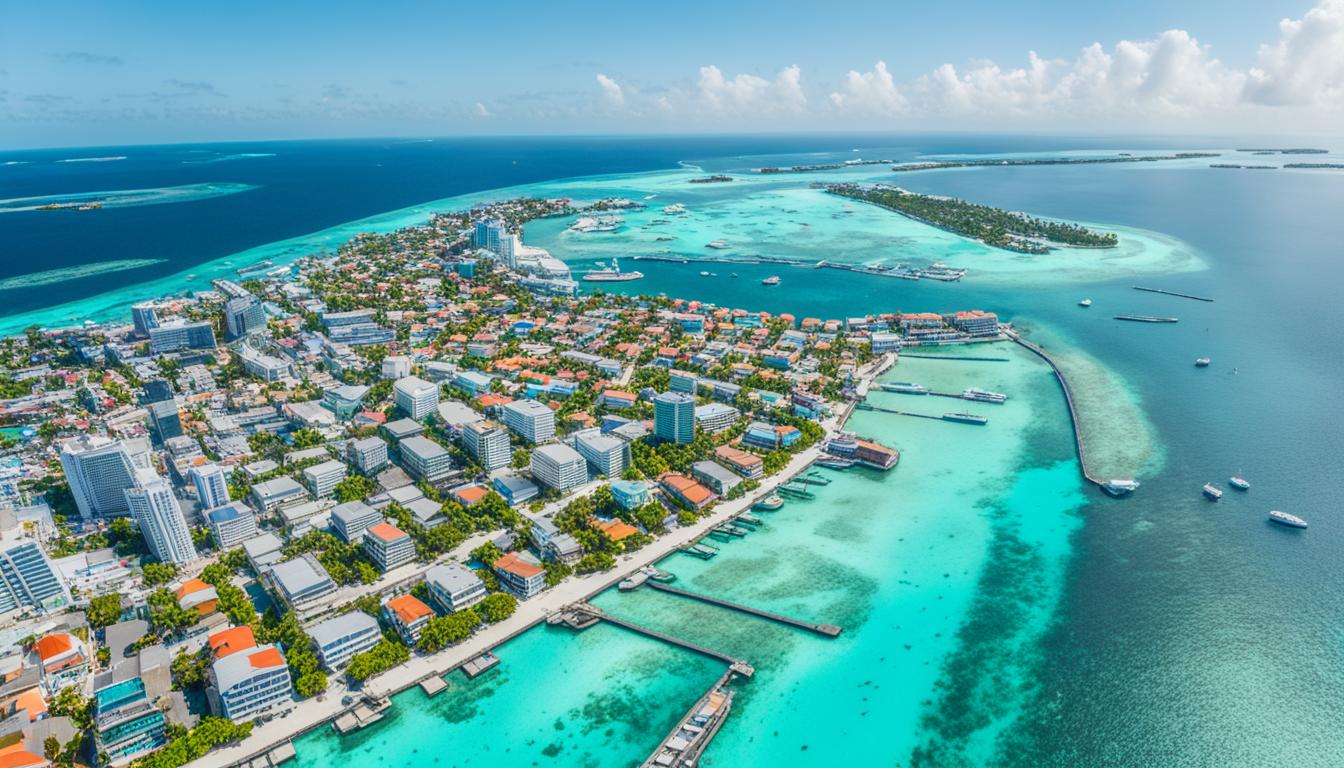Did you know that the Maldives, a tiny island nation in the Indian Ocean, is home to one of the world’s most extensive and diverse coral reef systems? These vibrant marine ecosystems are the lifeblood of the Maldives, supporting its thriving tourism industry and the livelihoods of its coastal communities. However, the Maldives’ coral reefs are facing a multitude of threats, from climate change and coastal development to unsustainable fishing practices.
In the capital city of Malé, a concerted effort is underway to manage and conserve these vital natural resources. The Maldives is leading the charge in coral reef management, employing a science-driven approach to preserve the country’s marine biodiversity and ensure a sustainable future for its blue economy.
Key Takeaways
- The Maldives is home to one of the world’s largest and most diverse coral reef systems, which are essential to the country’s economy and environment.
- The coral reefs in the Maldives face numerous threats, including climate change, coastal development, and unsustainable fishing practices.
- The capital city of Malé is leading the charge in coral reef management, employing a science-driven approach to conserve the nation’s marine biodiversity.
- The Maldives is committed to sustainable tourism and a blue economy, recognizing the importance of healthy coral reefs for the country’s future.
- International collaboration and community-based initiatives are crucial to the success of coral reef conservation efforts in the Maldives.
Introduction to Coral Reef Management in the Maldives
The Maldives is renowned for its breathtaking coral reefs, which not only captivate the senses but also serve as the foundation of the nation’s marine ecosystems and economy. These vibrant coral communities are not only a source of awe and wonder, but they also play a crucial role in protecting the low-lying islands from the erosive forces of the sea.
Importance of Coral Reefs to the Maldives
Coral reefs in the Maldives are more than just a natural wonder; they are the lifeblood of the nation. These marine habitats support a diverse array of marine life, providing a rich source of food and income for the local communities that depend on the sea. Moreover, the coral reefs act as natural barriers, safeguarding the islands from the devastating effects of waves, storms, and rising sea levels associated with climate change.
Threats to Coral Reefs in the Maldives
Despite their immense importance, the coral reefs of the Maldives are facing a multitude of threats. Overfishing, coastal development, pollution, and the impacts of climate change, such as ocean warming and acidification, have all contributed to the degradation and loss of these vital marine ecosystems. The Maldives government and conservation organizations are working tirelessly to address these challenges and ensure the long-term sustainability of the country’s coral reefs.
Maldives Coral Institute: A Science-Led Initiative
At the forefront of coral reef management in the Maldives is the Maldives Coral Institute, a science-driven organization dedicated to safeguarding these vital marine ecosystems. The institute’s mission is to leverage the latest research and innovative approaches to bolster the resilience of coral reefs, mitigate the impact of climate change, and restore degraded habitats.
Mission and Goals of the Institute
The primary goal of the Maldives Coral Institute is to ensure the long-term survival and adaptation of coral reefs in the face of a rapidly changing climate. Through rigorous scientific inquiry, the institute aims to identify areas of greater coral resilience, understand the factors that contribute to their ability to withstand environmental stressors, and develop effective methods for coral propagation and reef restoration.
Research and Conservation Efforts
The institute’s research agenda is multifaceted, encompassing studies on coral reef research, climate change resilience, and innovative reef restoration techniques. By collaborating with leading marine scientists and leveraging the latest technological advancements, the Maldives Coral Institute is spearheading efforts to safeguard the Maldives’ coral reefs and secure their long-term viability.
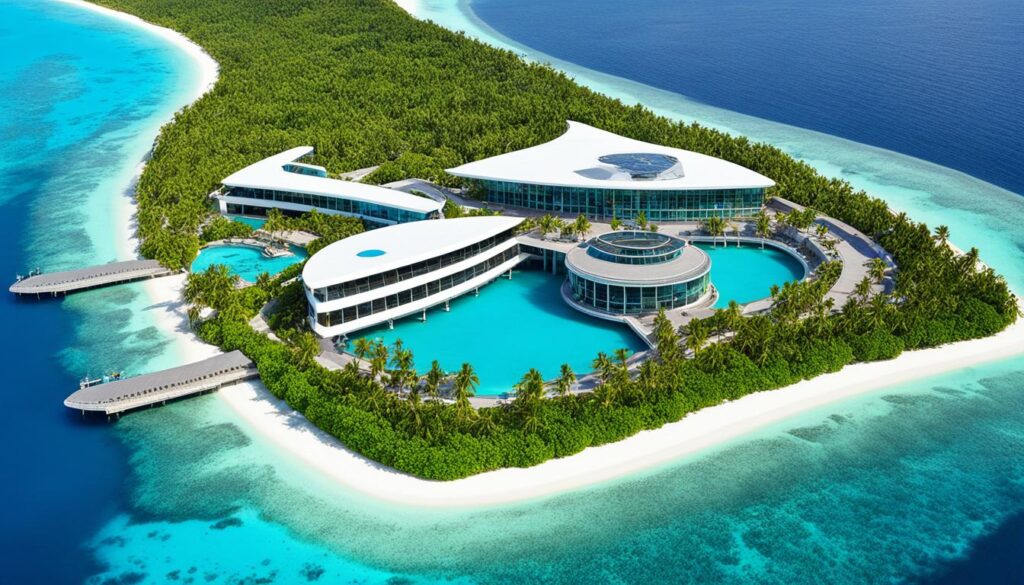
Through a holistic approach that combines scientific research, conservation initiatives, and community engagement, the Maldives Coral Institute is poised to play a pivotal role in ensuring the resilience and restoration of the Maldives’ maldives coral institute – a critical component of the island nation’s natural and cultural heritage.
Coral Reef Resilience and Climate Change Adaptation
As the Maldives grapples with the pressing challenges posed by climate change, the Maldives Coral Institute is leading the charge in identifying ways to bolster the resilience of the country’s vital coral reef ecosystems. Through rigorous research and innovative approaches, the institute is working to map areas of greater coral reef resilience and vulnerability across the Maldives.
Employing ecosystem-based approaches, the institute is testing various methods of coral propagation and reef restoration to promote the recovery of degraded reefs and restore critical ecosystem functions. These efforts are crucial in helping the Maldives’ coral reefs adapt to the escalating impacts of climate change, such as rising ocean temperatures, ocean acidification, and more frequent and severe weather events.
By identifying and safeguarding the most resilient coral reef areas, the Maldives Coral Institute is laying the groundwork for a more sustainable future for the country’s vital marine resources. Through these innovative climate change adaptation strategies, the institute aims to ensure the long-term survival and thriving of the Maldives’ iconic coral reef ecosystems.
Community-Based Coral Reef Management
In the Maldives, community-based conservation efforts are playing a crucial role in safeguarding the country’s precious coral reef ecosystems. The Maldives Coral Institute, in collaboration with the locally affiliated NGO Maldives Resilient Reefs (MRR), is spearheading initiatives to restore the Maldivian reefs as climate-resilient environments.
Engaging Local Communities
A key focus of these efforts is engaging local communities in the process of coral reef management. By empowering Maldivian marine conservationists and involving residents in decision-making, the institute aims to foster a sense of ownership and stewardship over the reefs. This approach ensures that conservation efforts are tailored to the unique needs and priorities of each island community.
Sustainable Fishing and Tourism
Alongside expanding marine protection, the institute is also working to improve fisheries management and promote sustainable tourism practices. By collaborating with local councils, such as the Laamu Hithadhoo Council, the institute has helped establish community-managed conservation areas that safeguard important marine habitats, including grouper spawning grounds and manta ray cleaning stations. These coral-friendly practices not only support the resilience of the reefs but also create opportunities for ecotourism and sustainable fishing that benefit local communities.
By fostering community engagement, strengthening local capacities, and implementing sustainable resource management strategies, the Maldives Coral Institute is leading the way in community-based conservation efforts that aim to ensure the long-term health and resilience of the Maldives’ invaluable coral reef ecosystems.
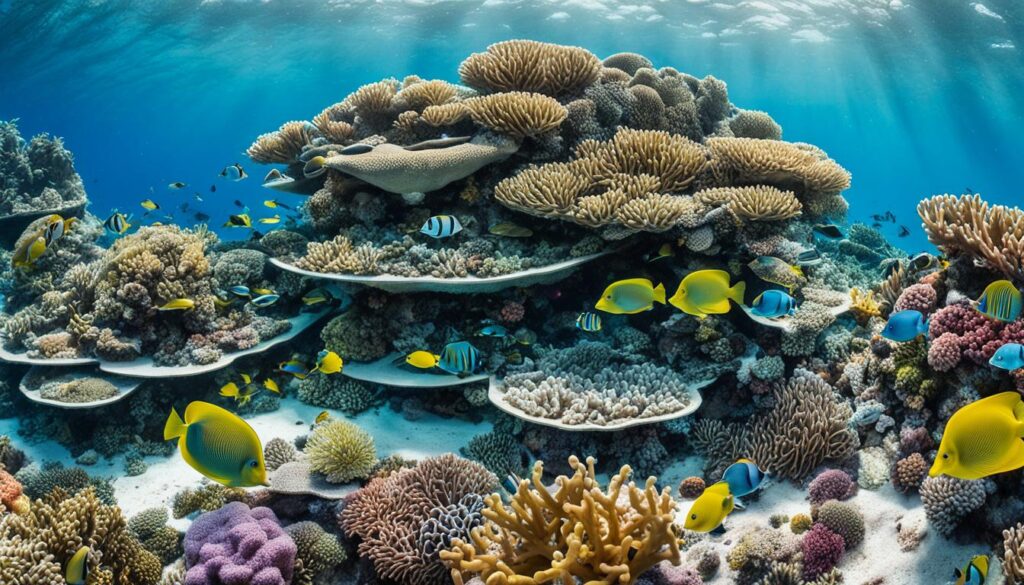
Marine Protected Areas and Coral Reef Conservation
The Maldives, renowned for its stunning coral reefs, has taken significant strides in establishing marine protected areas (MPAs) to safeguard its underwater treasures. These MPAs play a crucial role in the conservation of coral reefs and the preservation of the country’s rich marine biodiversity.
Existing MPAs with Coral Reefs
Nearly all of the MPAs in the Maldives are home to vibrant coral reef ecosystems. Some of the notable MPAs include Makunudhoo Kandu, Rasfari Region, Thanburudhoo Thila (HP Reef), Banana Reef, Giraavaru Kuda Haa, and Lions Head. These protected areas not only shield the coral reefs from harmful human activities but also serve as sanctuaries for a diverse array of marine life, from schools of colorful fish to majestic manta rays.
In addition to these well-established MPAs, the Maldives has also designated the Hanifaru area, Anga Faru, Mendhoo region, and Fuvahmulah Nature Park as protected zones, further demonstrating its commitment to coral reef conservation and biodiversity protection. These initiatives have been instrumental in maintaining the health and resilience of the Maldives’ marine ecosystems, ensuring that they continue to thrive for generations to come.
Maldives: Coral reef management Malé Maldives
As the bustling capital of the Maldives, Malé is at the forefront of the country’s efforts to manage and conserve its precious coral reef ecosystems. The Maldives Coral Institute, a science-led initiative, is playing a crucial role in mitigating the impacts of infrastructure developments within Malé through targeted relocation of corals to safer areas, as well as by promoting the use of coral-friendly and environmentally sustainable approaches to coastal protection and development.
Coral-Friendly Infrastructure in the Capital
The Maldives Coral Institute is working closely with the government and local authorities to ensure that Malé’s ongoing infrastructure projects and coastal development initiatives are designed and executed in a manner that minimizes harm to the surrounding coral reefs. This includes the relocation of vulnerable coral colonies to designated “coral nurseries” and the use of coral-friendly construction materials and methods that avoid direct damage to the marine environment.
By embracing sustainable development practices, Malé is setting an example for other cities in the Maldives and beyond, demonstrating how capital city initiatives can support the long-term health and resilience of coral reef ecosystems. This holistic approach to coral reef management in the capital is a crucial component of the Maldives’ broader efforts to preserve its unique marine biodiversity and natural heritage.
Sustainable Coastal Development and Coral-Friendly Infrastructure
As the Maldives grapples with the pressing challenges of climate change and environmental conservation, the Maldives Coral Institute has taken the lead in promoting sustainable coastal development and coral-friendly infrastructure. Recognizing the vital role that healthy coral reefs play in protecting the island nation’s fragile coastlines, the institute is spearheading research into global best practices that prioritize the preservation and restoration of natural habitats.
One of the institute’s key initiatives is exploring alternative, more environmentally benign approaches to coastal protection. Instead of traditional hard-engineering solutions, such as seawalls and breakwaters, the researchers are investigating the potential of nature-based methods, including the restoration or creation of mangrove forests and other natural habitats. These natural infrastructure solutions not only safeguard against coastal erosion and flooding but also provide valuable ecosystem services, such as carbon sequestration and habitat for marine life.
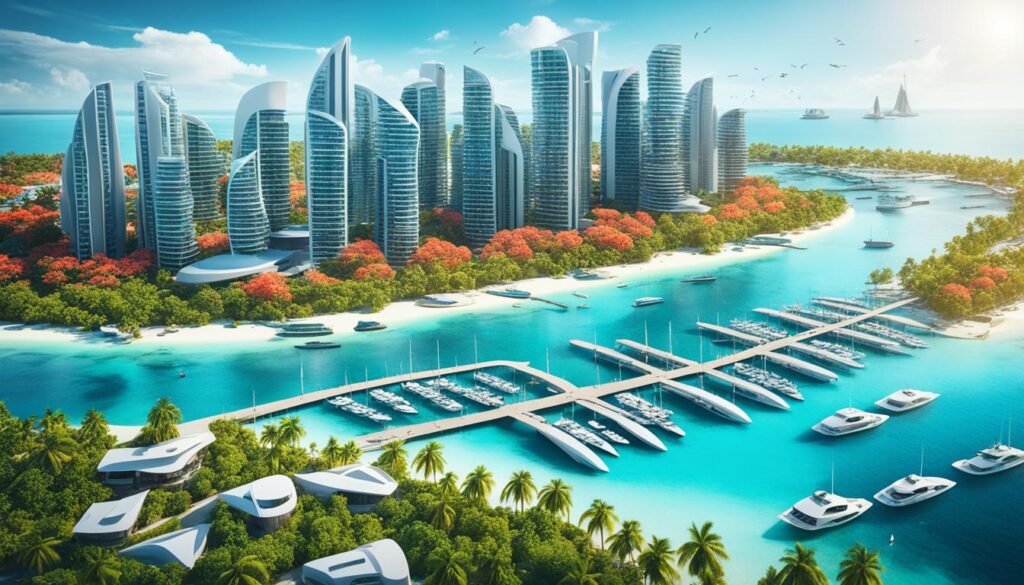
The Maldives Coral Institute’s work on sustainable coastal development and coral-friendly infrastructure is crucial for the nation’s long-term resilience. By promoting the integration of natural habitat restoration and environmentally responsible design principles, the institute aims to ensure that the Maldives’ iconic coastlines and vibrant coral reefs are protected for generations to come.
International Collaboration and Global Efforts
The Maldives Coral Institute has recognized the importance of international cooperation in preserving the world’s coral reefs, a vital resource that faces dire threats from climate change and other environmental challenges. By actively participating in regional and global networks focused on managing and mitigating these threats, the institute aims to raise the profile of coral reef conservation on the international stage.
One key initiative is the institute’s support for high-level participation in global forums addressing issues like international cooperation, global coral reef conservation, and climate change mitigation. This includes collaborating with other nations dependent on coral reefs to seek shared solutions to the problems they face.
Through these international partnerships and collaborative efforts, the Maldives Coral Institute hopes to leverage the collective resources and expertise of the global community to develop innovative strategies for protecting and restoring the world’s coral reefs. By working together, the institute believes that significant progress can be made in safeguarding this invaluable ecosystem for future generations.
Awareness and Education Campaigns
In the Maldives, coral reef conservation is a crucial priority, and the Maldives Coral Institute plays a pivotal role in driving awareness and education efforts. One of the institute’s flagship initiatives is the annual Coral Festival, a celebration that aims to ignite public interest and appreciation for the country’s invaluable coral reef ecosystems.
Coral Festivals and Public Outreach
The Coral Festival is a captivating event that brings together the local community, tourists, and decision-makers to explore the significance of coral reefs to the Maldives’ national security and overall well-being. Through interactive exhibits, educational displays, and engaging activities, the festival fosters a deeper understanding of the threats facing these fragile underwater habitats and the critical need for their protection and conservation.
In addition to the Coral Festival, the Maldives Coral Institute also collaborates with international researchers to facilitate scientific expeditions and promote public outreach. Following these expeditions, the institute creates and distributes media content, such as educational videos and informative brochures, to raise coral reef awareness among the general public and policymakers, ensuring that the importance of these ecosystems remains at the forefront of the national agenda.
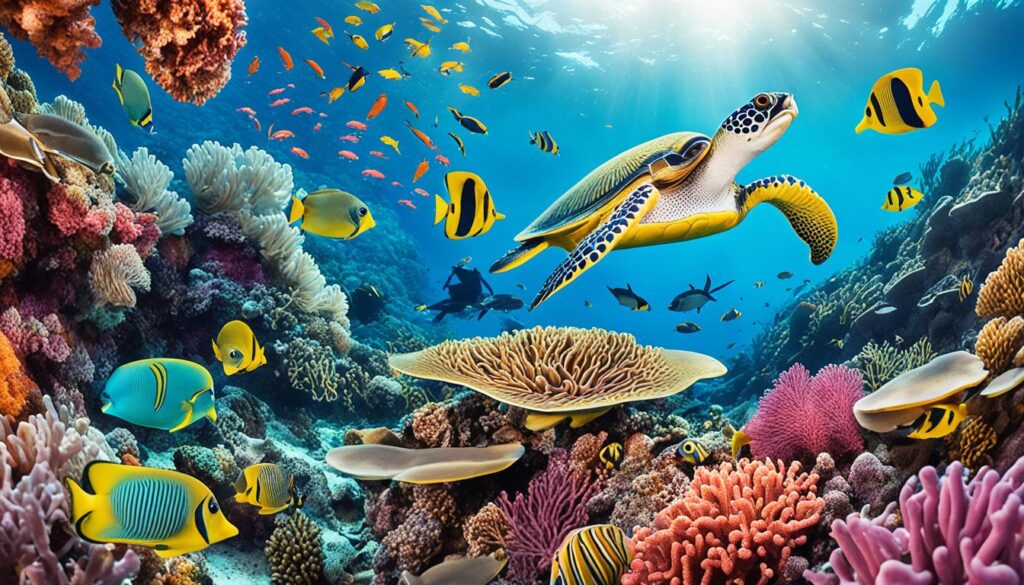
By combining these targeted awareness and education campaigns, the Maldives Coral Institute is actively engaging the community and fostering a collective sense of responsibility for the preservation of the country’s precious coral reefs. Through these efforts, the institute aims to empower individuals and inspire meaningful action towards sustainable management and conservation of this invaluable natural resource.
Challenges and Future Prospects
The Maldives faces significant challenges in managing and conserving its precious coral reef ecosystems. As the impact of climate change continues to intensify, the nation’s coral reefs are under increasing threat from rising ocean temperatures, ocean acidification, and more frequent and severe weather events. Coastal development and unsustainable resource exploitation also pose major challenges to the long-term health of these vital marine habitats.
Despite these formidable obstacles, the Maldives Coral Institute and its partners are working tirelessly to address the coral reef management challenges. Through science-based initiatives, the institute is exploring ways to build coral reef resilience and adapt to the changing climate. By engaging local communities, they are promoting sustainable fishing and tourism practices that can help preserve the reefs for future generations.
Sustainable development is also a key focus, as the Maldives seeks to balance economic growth with the need to protect its delicate marine ecosystems. International collaboration and global efforts are critical, as the Maldives works alongside other countries and organizations to share knowledge, resources, and best practices in coral reef conservation.
The road ahead is undoubtedly challenging, but the Maldives is committed to safeguarding its coral reefs for the long-term. With continued research, community engagement, and international cooperation, the nation can overcome the coral reef management challenges and ensure a sustainable future for its unique and irreplaceable marine environments.
Conclusion
The Maldives’ coral reefs are the lifeblood of the nation, underpinning its economy and environment. However, these precious ecosystems face a myriad of threats, from climate change to coastal development. The Maldives Coral Institute, based in the capital city of Malé, is leading the charge to manage and conserve the country’s coral reefs through science-driven initiatives, community-based approaches, and international collaboration.
By addressing the challenges of climate change adaptation, the institute is working to build resilient coral reef systems that can withstand the impacts of rising temperatures and ocean acidification. Similarly, the institute’s efforts to promote sustainable coastal development and coral-friendly infrastructure are crucial in mitigating the human-induced stresses on these fragile habitats.
Through public outreach and education campaigns, the Maldives Coral Institute is also raising awareness about the importance of coral reef conservation and the need for collective action to safeguard this invaluable natural resource. As the Maldives continues to navigate the delicate balance between economic development and environmental protection, the institute’s work will be instrumental in securing a sustainable future for the country’s coral reefs and the communities that depend on them.
Source Links
- Maldives Coral Institute – https://www.maldivescoral.org/
- Maldives Marine Protected Area | Restoring Maldives Coral Reef – https://www.bluemarinefoundation.com/projects/maldives/
- Maldives | ICRI – https://icriforum.org/members/maldives/
